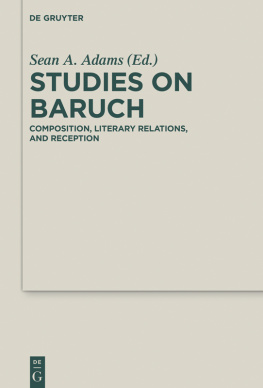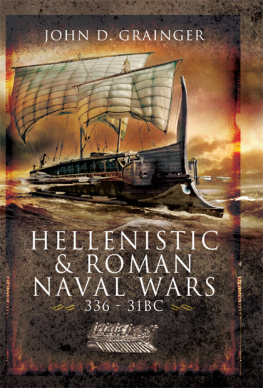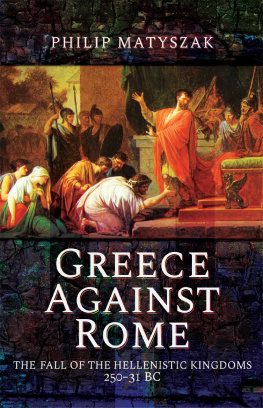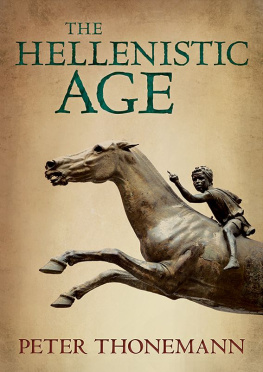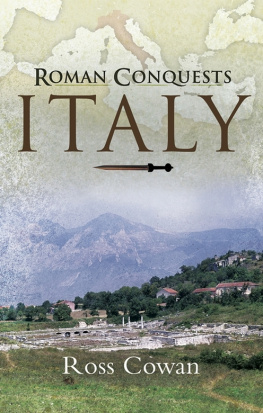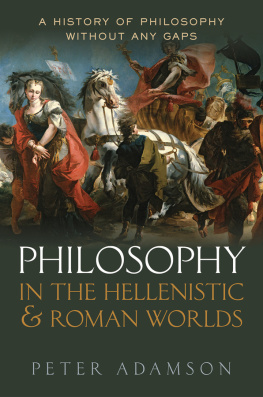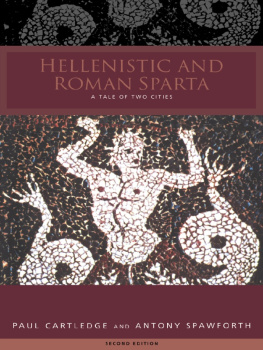Sean A. Adams - Scholastic Culture in the Hellenistic and Roman Eras
Here you can read online Sean A. Adams - Scholastic Culture in the Hellenistic and Roman Eras full text of the book (entire story) in english for free. Download pdf and epub, get meaning, cover and reviews about this ebook. year: 2019, publisher: De Gruyter, genre: Religion. Description of the work, (preface) as well as reviews are available. Best literature library LitArk.com created for fans of good reading and offers a wide selection of genres:
Romance novel
Science fiction
Adventure
Detective
Science
History
Home and family
Prose
Art
Politics
Computer
Non-fiction
Religion
Business
Children
Humor
Choose a favorite category and find really read worthwhile books. Enjoy immersion in the world of imagination, feel the emotions of the characters or learn something new for yourself, make an fascinating discovery.

- Book:Scholastic Culture in the Hellenistic and Roman Eras
- Author:
- Publisher:De Gruyter
- Genre:
- Year:2019
- Rating:5 / 5
- Favourites:Add to favourites
- Your mark:
- 100
- 1
- 2
- 3
- 4
- 5
Scholastic Culture in the Hellenistic and Roman Eras: summary, description and annotation
We offer to read an annotation, description, summary or preface (depends on what the author of the book "Scholastic Culture in the Hellenistic and Roman Eras" wrote himself). If you haven't found the necessary information about the book — write in the comments, we will try to find it.
Sean A. Adams: author's other books
Who wrote Scholastic Culture in the Hellenistic and Roman Eras? Find out the surname, the name of the author of the book and a list of all author's works by series.
Scholastic Culture in the Hellenistic and Roman Eras — read online for free the complete book (whole text) full work
Below is the text of the book, divided by pages. System saving the place of the last page read, allows you to conveniently read the book "Scholastic Culture in the Hellenistic and Roman Eras" online for free, without having to search again every time where you left off. Put a bookmark, and you can go to the page where you finished reading at any time.
Font size:
Interval:
Bookmark:
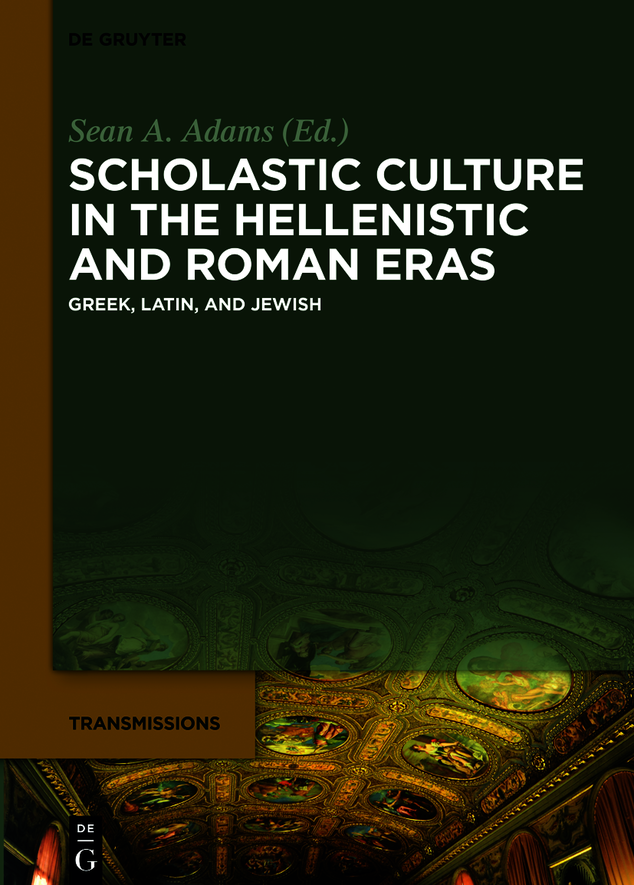
Scholastic Culture in the Hellenistic and Roman Eras
Transmissions
Studies on conditions, processes and dynamics of textual transmission
Edited by
Volume
Greek, Latin, and Jewish
Edited by
Sean A. Adams

ISBN 9783110657876
e-ISBN (PDF) 9783110660982
e-ISBN (EPUB) 9783110657999
Bibliographic information published by the Deutsche Nationalbibliothek
The Deutsche Nationalbibliothek lists this publication in the Deutsche Nationalbibliografie; detailed bibliographic data are available on the Internet at http://dnb.dnb.de.
2019 Walter de Gruyter GmbH, Berlin/Boston
This project would not have been possible without the generosity of the British Academy. The volume before you is a collection of essays presented at Ancient Scholarship: Scholastic Culture in the Hellenistic and Roman Eras, held at University of Glasgow in April 2017. This was the follow-up conference to a colloquium in October 2015 on The Future of Academic Publishing, also held at the University of Glasgow. Both events and the subsequent dissemination of findings are in fulfilment of the British Academys Rising Star for Engagement Award that I received. I am very grateful to the Academy for their investment in early career scholars and their willingness to fund topics that might not otherwise receive financial support.
Thanks are due to my institution, the University of Glasgow, and my colleagues in both the Classics and Theology and Religious Studies subject areas. My colleagues make Glasgow University a supportive place to work and I appreciate that departmental categorisations are not a barrier to collaborative work. Thank you to all who attended and presented.
I would also like to thank the different reviewers of this volume and their comments, which helped make the volume better. Zachary Vickery, my doctoral student, is also to be thanked for his work on the indices.
Finally, a majority of the organisational work for both conferences was undertaken by Zanne Domoney-Lyttle. Zanne worked tirelessly to ensure that the events progressed smoothly and that the presenters were well plied with coffee, scones, and Scottish food. Both conferences are better because of her involvement and I am deeply grateful for her efficiency, positive attitude, and support.
Sean A. Adams Glasgow, UK March 2019 |
This volume is a collection of papers presented at Ancient Scholarship: Scholastic Culture in the Hellenistic and Roman Eras, a conference funded by the British Academy and held at the University of Glasgow, UK on 2728 April 2017. The purpose of this conference was to investigate scholastic culture in the Hellenistic and Roman eras, with a particular focus on ancient book and material culture as well as scholarship beyond Greek authors and the Greek language. Although ancient scholarship is a burgeoning field of study, a majority of investigations have focused primarily (and sometimes exclusively) on Greek scholarship and do not readily engage with the literature and languages of other cultures. Such studies are valuable contributions, but they do not represent the breadth of scholastic activity undertaken in antiquity. Accordingly, one of the major contributions of this work is the inclusion of multiple perspectives and its contributors engage not only with elements of Greek scholastic culture, but also bring Greek ideas into conversation with developing Latin scholarship (see chapters by Dickey, Nicholls, Marshall) and the perspective of a minority culture (i.e., Jewish authors) (see chapters by Hezser, Adams). This multicultural perspective is an important next step in the discussion of ancient scholarship and this volume provides a starting point for future inquiries.
In particular, the essays in this volume make important contributions and provide fresh insight into a few, specific areas. First, one of the fundamental aspects of this collection is the importance of book culture and the materiality of scholarship. Many works on ancient scholarship are limited to discussions of specific authors, texts, and ideas, but do not take into account the means by which scholarship is accomplished in ancient times. This singular focus is a clear oversight of the highly complex and interconnected nature of scholastic research. As a result, the importance of the intersection of text and scholar is highlighted in a number of chapters and is one of the theoretical underpinnings of this volume.
This framework is evident in the chapter by Stephanie Roussou, New Readings in the Text of Herodian. Although Roussou provides fresh proposals for Herodians (On Prosody in General), her discussion is not limited only to the text as reconstructed. Rather, Roussou also evaluates newly-discovered manuscripts and discusses what they mean for our understanding of Herodian, his work and its reception, and the scholastic environment in which he wrote and in which his work was used. Here Roussou takes seriously the material nature of scholastic production and provides new and corrective insights to previous scholarship.
Fundamental to discussions of scholarship is the question of the scholars access to texts. When thinking about scholarship in the Graeco-Roman world it is tempting to assume that scholars have ready access to the texts and materials necessary for their study. However, this assumption is rarely accurate, not only amongst those in communities and cultures that are not known for being intellectual hubs, but also amongst Greek and Latin elites. As can be seen from the laments of elite authors in the Roman era, even prominent scholars and writers have difficultly accessing texts. Moreover, the texts to which they do have access are not always in great condition or well edited (e.g., Galen, Peri Alupias 13, 19; Plutarch, Dem. 1.12).
At the same time, there is a strong, and indeed necessary, connection between texts and oral tradition. Not all scholarship is limited to texts, as can clearly be shown in some of the philosophical and rabbinic schools. In these communities, texts as well as received teachings form the basis of scholarly discussions, but they are also subsequently commented upon by later teachers, whose teachings, if warranted, become codified and part of the received tradition for subsequent generations. The intersection of oral and written teaching and the deep interplay between them through the centuries is understudied, primarily because we only have access to oral material if it was written down. In this instance, Classics scholars have much to gain from scholars of rabbinics and of later Judaism, whose key texts (i.e., Qumran scrolls, Mishnah, Tosefta, targumim) are codifications of collected wisdom of previous sages and represent one aspect of the process of textualisation.
When scholars do have access to texts, their location needs to be considered. In their contributions to this volume, Matthew Nicholls, Myrto Hatzimichali, and Galle Coqueugniot address how literary fora, such as bookshops, libraries, and archives, influence ancient research practices, highlighting the issues and challenges of accessing and disseminating texts in the Graeco-Roman world.
Font size:
Interval:
Bookmark:
Similar books «Scholastic Culture in the Hellenistic and Roman Eras»
Look at similar books to Scholastic Culture in the Hellenistic and Roman Eras. We have selected literature similar in name and meaning in the hope of providing readers with more options to find new, interesting, not yet read works.
Discussion, reviews of the book Scholastic Culture in the Hellenistic and Roman Eras and just readers' own opinions. Leave your comments, write what you think about the work, its meaning or the main characters. Specify what exactly you liked and what you didn't like, and why you think so.

